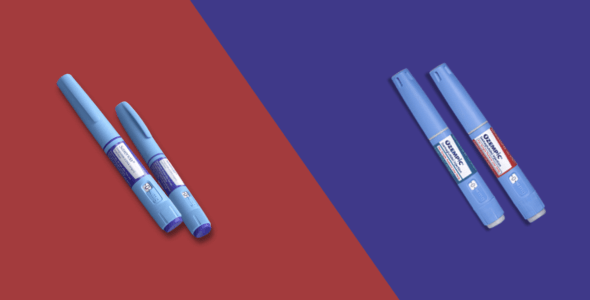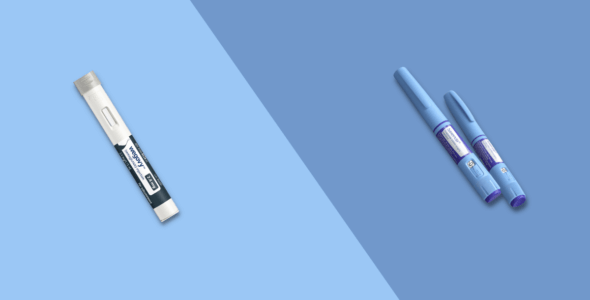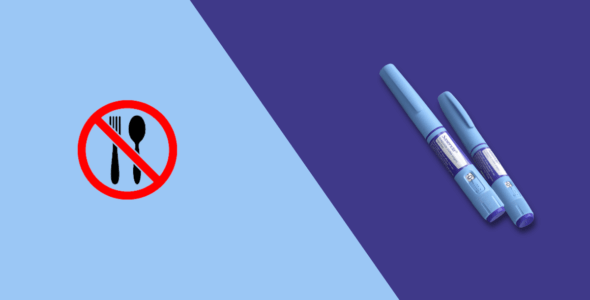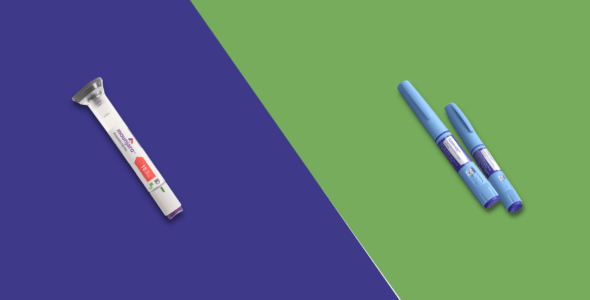Saxenda Coupon & Prices
Compounded GLP-1 weight loss medications prescribed online, as low as $249 per month
Get StartedSaxenda manufacturer coupon
Prescription drug coupons are provided by manufacturers to help individuals save on their medications. Sign up to find out if you are eligible to receive a Saxenda Savings Card and pay as low as $25 for your Saxenda up to a maximum benefit of $200 per prescription. To find out if you are eligible, view details and read the requirements carefully to ensure you are qualified.
Is NiceRx a Saxenda coupon provider?
NiceRx is not a Saxenda coupon, Saxenda discount card, or Saxenda copay card provider. We do not offer Saxenda manufacturer coupons, Saxenda discounts, rebates, Saxenda savings cards, trial offers, or free Saxenda samples.
Saxenda patient assistance program
Patient assistance programs are typically sponsored by pharmaceutical companies and provide free or discounted medications to individuals with low income who are uninsured or under-insured and meet the eligibility criteria that vary by program. There are currently no known patient assistance programs for this medication.
Can NiceRx help me get Saxenda cheaper if I have insurance?
How much is Saxenda with insurance?
The cost of Saxenda with insurance will depend on the terms of your healthcare plan. Your healthcare provider or pharmacist will be able to calculate your copay with your current insurance. Contact them to find out more.
How much does Saxenda cost without insurance?
Saxenda prices without insurance will vary depending on how much you buy. Prices will also vary by retailer. As a guide, Saxenda subcutaneous solution (18 mg/3 mL) will cost around $1,400 for 15 milliliters.
What is Saxenda?
Saxenda contains the prescription medicine liraglutide. Liraglutide is similar to a naturally occurring hormone in the body that controls digestion, insulin levels, and blood sugar levels. Saxenda is recommended alongside a reduced-calorie diet and an increase in exercise. It is used to help manage obesity in adult patients with a body mass index (BMI) of
- 30 kg/m2 or more, or
- 27 kg/m2 or more, if you have high blood pressure, type 2 diabetes, or high cholesterol, triglycerides, or a low HDL cholesterol level that is making plaque build up in your arteries worse
Saxenda is not specifically for the treatment of type 1 or type 2 diabetes or weight loss. Saxenda is part of a treatment plan that will include, diet, exercise, and weight management.
Saxenda is given as a subcutaneous injection under the skin. It can be given at any time of the day, with or without a meal. Saxenda comes in a prefilled pen. You should not inject into the same place two times in a row. If the injection has particles in it or changed color, do not use it. Speak to your pharmacist for a new medicine. You should dispose of used needles and syringes by using a puncture-proof disposal sharps container. Store unopened pens in the refrigerator. In-use pens may be kept at room temperature for up to 30 days. Always remember to store your medicine out of the reach of children and pets.
More information on what is Saxenda and Saxenda dosage
Saxenda active ingredients
Liraglutide is classed as an acylated human glucagon-like peptide-1 (GLP-1) receptor agonist. Liraglutide binds to and activates the GLP-1 receptor. Unlike naturally occurring GLP-1 in the body, which has a half-life of up to 2 minutes, liraglutide is stable against breakdown by enzymes in the body and has a half-life of 13 hours. Because liraglutide has delayed absorption and plasma protein binding and has a half-life of 13 hours it can be given once daily by subcutaneous injection.
GLP-1 is classed as a physiological regulator of appetite and calorie intake. This means it works by a method known as negative feedback. The GLP-1 receptor is seen in several areas of the brain involved in appetite regulation.
Saxenda side effects
The most common side effects caused by Saxenda include:
- Nausea, vomiting, and stomach pain
- Diarrhea
- Constipation
- Fast heart rate
- Tiredness
- Headaches and dizziness
In rare instances, Saxenda can cause more serious side effects. These can include:
- Increased heart rate
- Suicidal thoughts or sudden changes in behavior and mood
- Severe nausea, vomiting, or diarrhea that will not stop
- Hypoglycemia (very low blood sugar levels) – feeling very weak, shaking, confused, sweating, fainting, or seizures
- Pain or difficulty to urinate, swelling in ankles or feet, tiredness, and difficulty breathing
- Trouble swallowing, lump, or swollen neck
- Jaundice – yellowing of eyes or skin, darker stools, upper stomach pain spreading to back
Your doctor will assess the benefits of using Saxenda against your risk of side effects.
Saxenda drug interactions
Saxenda can interact with other medications. These include:
- Bexarotene – cancer treatment
- Gatifloxacin – an antibiotic
- Insulin – aspart, detemir, glargine, lispro
- Oral diabetes medicines – glipizide, glimepiride
- Antiviral medication – amprenavir, atazanavir, darunavir, ritonavir, saquinavir
- Diuretics – bendroflumethaizide, bumetanide, furosemide
- Antibiotics – ciprofloxacin, clarithromycin, norfloxacin
- Corticosteroids – dexamethasone, fludrocortisone, prednisolone
This list is not exhaustive and other drugs may interact with Saxenda.
Saxenda warning and precautions
You should not use Saxenda if you:
- Are allergic to the active ingredient liraglutide
- Are allergic to any of the other ingredients in Saxenda
- Are using insulin or albiglutide, dulaglutide, or exenatide
- Have multiple endocrine neoplasia type 2
- Have a family history of medullary thyroid carcinoma
- Have diabetic ketoacidosis
- Are under 18 years of age
Talk to your doctor before using Saxenda if you:
- Are taking any of the medications that could interact with Saxenda
- Have kidney disease
- Have liver disease
- Have high cholesterol or triglycerides
- Have heart problems
- Have problems with your pancreas or gallbladder
- Have depression or suicidal thoughts
- Have stomach or digestion problems
- Are pregnant or are planning to become pregnant
- Are breastfeeding or are planning to breastfeed
Related medications
Saxenda research & news
The content on this website is intended for information purposes only. It does not constitute medical advice. The information on this website should not be relied upon and is not a substitute for professional medical advice. You should always speak to your doctor regarding the risks and benefits of any treatment.



